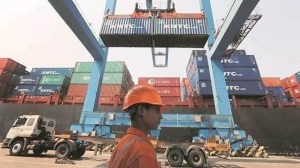Wheat sowing a week away, Punjab sees only 22% paddy harvesting
Despite favourable weather, farmers have either stalled or are slowing down harvests due to lack of space.
 Labourers are loading the paddy grain after procurement in a truck at grain market near Sirhind road in Patiala. (Express Photo by Harmeet Sodhi)
Labourers are loading the paddy grain after procurement in a truck at grain market near Sirhind road in Patiala. (Express Photo by Harmeet Sodhi)With wheat sowing just a week away, only 22 per cent paddy was harvested in Punjab till Thursday despite good weather conditions.
This year’s paddy harvesting is also around 20 per cent less compared to last year, when prolonged rains delayed harvesting by around 10 days. This has been a cause of concern for many farmers who have either stalled or are slowing down harvests due to the lack of space in mandis across the state. This is despite the crop ripening in the fields.
Punjab, which has around 1,852 grain markets and typically converts several rice shellers into temporary mandi yards, is facing serious issues with crop movement this year. Only 10.55 per cent of the procured paddy has been lifted from mandis, leaving many full to the brim. The situation is particularly dire in regions where farmers have no space to unload their crops.
Deepinder Singh, a farmer from Hazara village in Jalandhar, who has around 50 acres under paddy, said that the crop is standing ready in the fields, but there is no place in the mandis. “Last year, by this time, I had harvested almost 90 per cent of my crop, but this year not even 50 per cent of my fields are harvested. I am worried that this delay will affect my wheat crop,” he said, adding that the ideal time for wheat sowing is between November 1 and November 15.
Director of the Punjab Agriculture Department Jaswant Singh confirmed that around 22 per cent of paddy has been harvested so far and it is significantly lower than last year’s progress. “The pace of harvesting is quite slow this time,” he added.
Sources in the Punjab Food and Civil Supplies Department attributed the slow lifting of the crop to the lack of cooperation from rice shellers, who have raised several demands with the government. “It’s difficult to move the procured grain out of mandis without the cooperation from rice shellers. Over 5,000 shellers store the entire government procured paddy in the state, and the rice used to go to government godown after milling. But this year, the shellers have some demands, and the government has not responded to them, which is leading to this bottleneck,” said an official from the department.
Farmer leader Jagmohan Singh, general Secretary of BKU (Dakaunda), said that as the situation drags on, farmers are growing increasingly anxious about the delay as this would affect timely sowing of wheat. “We are urging the government to resolve the ongoing issues with rice shellers and avoid further disruption to the agricultural cycle or else the government will be responsible for the serious law and order issue in the state. “The delay in harvesting and movement of the crop could also have broader economic implications for Punjab, which relies heavily on its agricultural output. If the situation is not resolved soon, it may lead to additional costs for both farmers and the state government in managing the glut of paddy in the markets,” he said.
According to the records of Food, Civil Supplies, and Consumer Affairs Department, Punjab, by October 23, 2023, around 49 lakh tonne of paddy had arrived in the mandis. However, this year till October 23, only 41 lakh tonne have reached mandis, marking a shortfall of approximately nine lakh tonne compared to last year. Punjab is expecting 185 lakh tonne paddy arrival in mandis this year.
In Tarn Taran district, 5.50 lakh tonne of paddy arrived by October 23 last year, whereas this year, only 3.40 lakh tonnes have reached the mandis in the same time. Similarly, in Sangrur, only 1.46 lakh tonne of paddy have been brought to the mandis till October 23, compared to over 2.50 lakh tonne during the same period last year. In Gurdaspur, the arrival has also seen a significant drop, with 50% less paddy arriving this year than last.
This decline in arrivals is being attributed to slower paddy harvesting, primarily due to the massive glut in the mandis, which has led to farmers stalling or delaying their harvests, said a senior officer in the Punjab Agriculture department.







